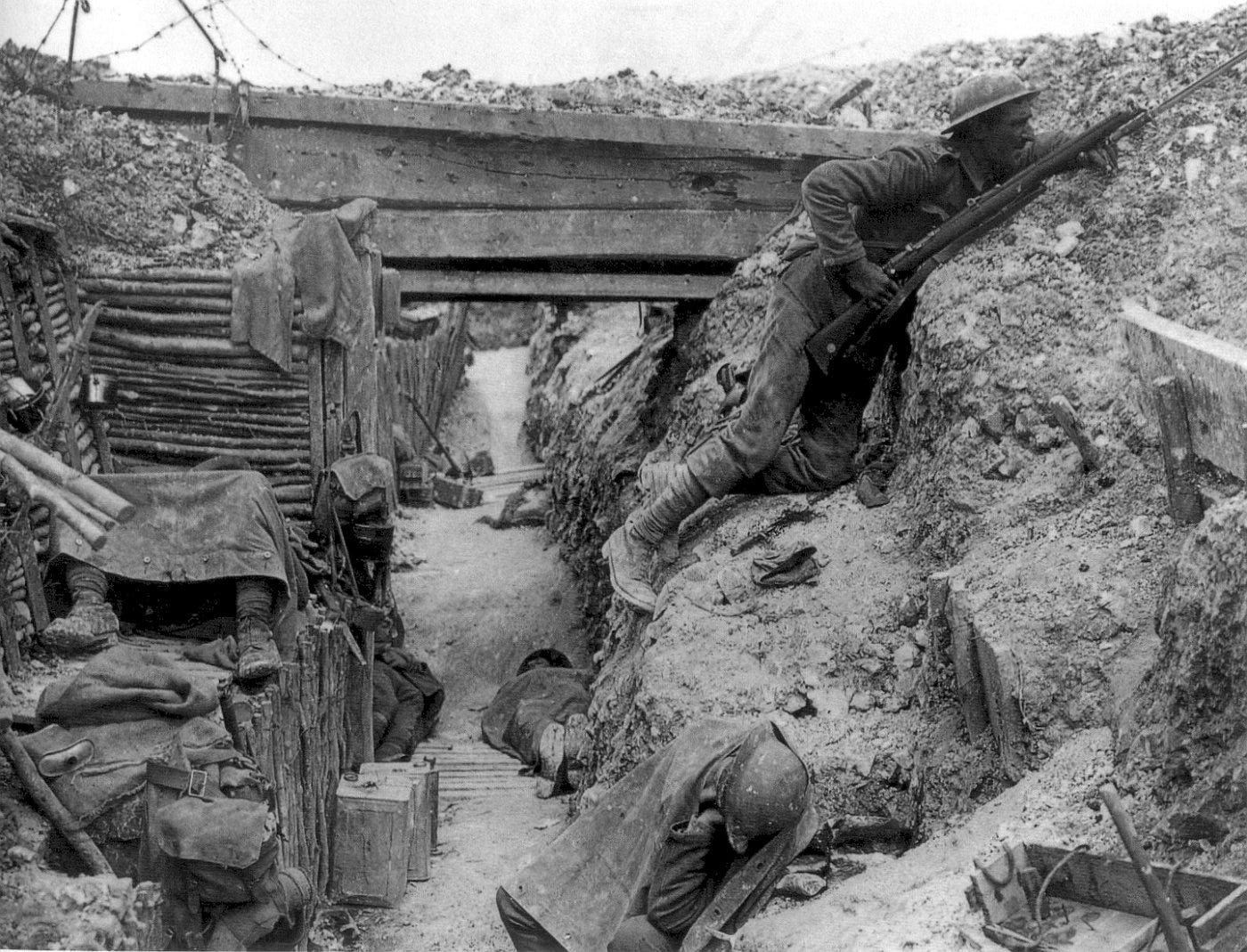Listen to a reading of this story by Theresa:
Tom waded ankle-deep, grimacing against the cold water seeping into his boots. Thick wool socks soaked and snatched his skin. No point moaning, Manning would tell him he was lucky he had socks.
‘Many a man has raw skin against hard boots. Or a foot rotted away by standing too long in water.’
Water. That other persistent enemy. Rolling off his metal hat, chilling his spine, slowing his route to the tin-sheet roof over the dugout. Tom sat for late watch on the compacted mud shelf. First the unwritten regulations.
Get your breathing under control. Hides your location. Steadies the trigger finger.
Stamp your feet against the planks. Brings blood to the toes. Warns off the trench rats.
Then the periscope. Hammered to the slats. Useless under night clouds. He noted the darkness in another pointless report. Manning was a bastard for reports.
‘Record it for the next man. Always think about the next man.’
Tom teased a woodbine out of his breast pocket. He dug deeper. No matches. Dry ones were a rare commodity. He squinted into the darkness along the straight line of trench hoping for the glow of a cigarette. No luck. You learned fast here to sleep while you could, where you could. Exhaustion helped. In a few hours he’d be replaced by the next man. Then he could sleep.
Could sleep now.
Manning might come to check he was awake. Oblige him with a light if he found him with open eyes. Tom closed his eyes. The drumming rain threatening the tin roof evoked thoughts of home. A downpour lashing against steamed windows. Coal fire. Hot tea. It was difficult to recall details lately. Thoughts of home hit like the shock of a vivid dream that in this half-state of reality he couldn’t quite grasp. Mum and dad would be up at six for a cooked breakfast. Sausages spitting over gold-yoked eggs. Tom shook it away. Best not to think about that. Trench rations were like him, skin and bone. But he was young as Manning kept reminding them.
‘Soon be over, lads. Back in civvies. Build yourselves up again.’
He’d get back to his game. Build up his batting average. Tom whirled his arm in a reflex overhead spin, the action triggering Pavlovian thoughts of high teas in the clubhouse. Thwack! Cake.
‘Stop it,’ his whisper alien in the darkness but he tried it out again, for company. ‘Light? Anyone?’ the darkness didn’t reply.
Tom clasped the woodbine between his lips and adopted a trench-walking crouch to find someone half-awake in the chill night. Sound halted him. His fatigued brain took a moment to locate it. Pounding. Footfall above. The dull thud of the lobbed grenade finding ground.
Left arm in front, right vertically behind, deliver. Howzat!
The flash further down the trench. Boots. Louder. Closer. Booming. Tom stunned in blinding light. Nostrils smothering with the smell of charcoal. And something else, enticingly familiar.
Marzipan, his final thought as he fell to the trench floor. The woodbine released. Bobbing in his watery grave. All out.
Theresa Ryder holds an M.A. (Classics). She is recipient of the Molly Keane Creative Writing Award 2015 and Bealtaine Emerging Artist 2024. Literary contributions include: The 32: an Anthology of Irish Working Class Voices, Same Page Anthology, The HU, The Waxed Lemon, The Irish Times, and Eat the Storms podcast. She was awarded a place on the 2022 National Mentoring Programme and 2024 Northern Soul Roadshow from the Irish Writers Centre. She is currently writing a memoir about her years as assistant to the late author/artist J.P. Donleavy, aided by an English literature bursary from the Arts Council of Ireland.




Well done, Theresa - I felt I was there with Tom - you really set the time, place and utter bleakness.